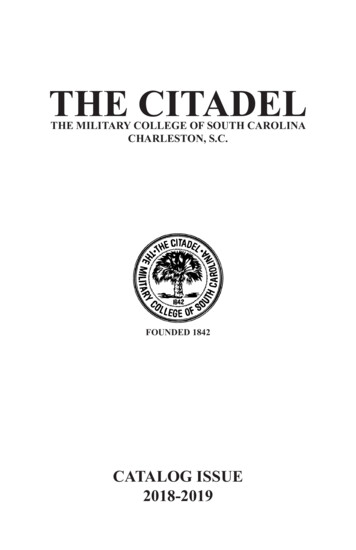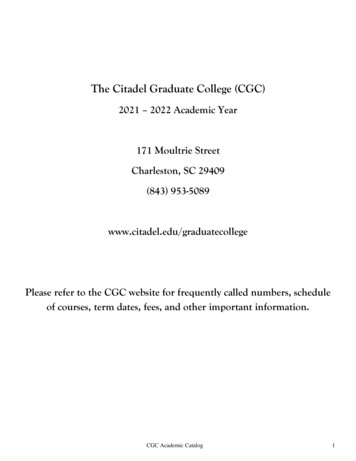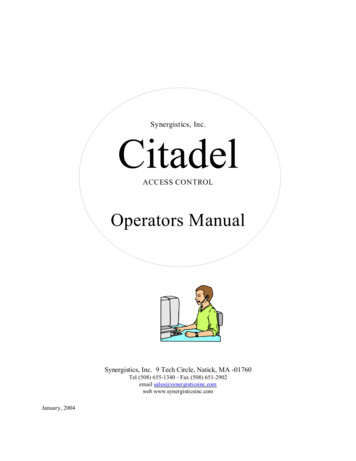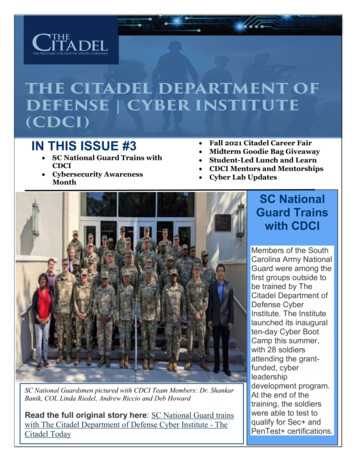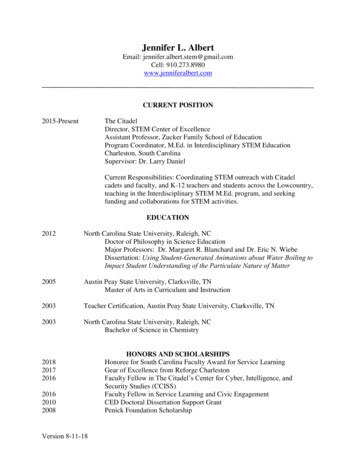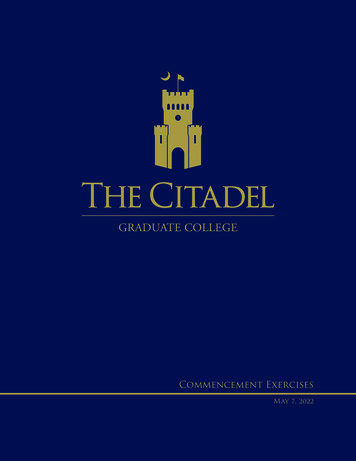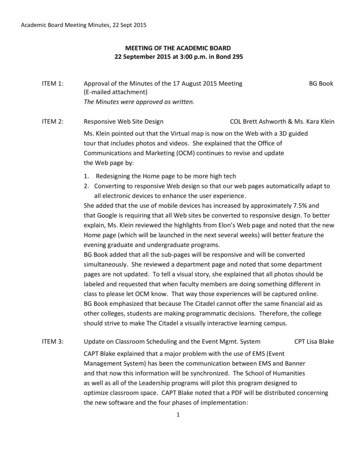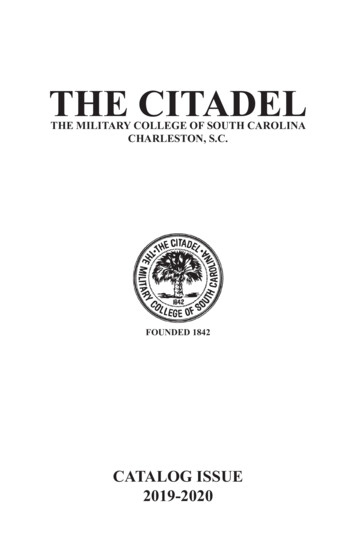
Transcription
THE CITADELTHE MILITARY COLLEGE OF SOUTH CAROLINACHARLESTON, S.C.FOUNDED 1842CATALOG ISSUE2019-2020
LeadershipSince 1842, The Citadel has molded individuals into leaders. Aswe enter a new millennium, The Citadel reaffirms its belief thatthe whole person is one who is worthy of the trust of others. Thefollowing qualities of leadership will be the guiding principles forThe Citadel as we develop a new generation of leaders to servetheir families, their communities, their professions, and their country.Citadel Core ValuesHonor Duty RespectThe Characteristics of Principled LeadershipLead with humilityEmbrace a true, authentic selfAct and speak with courageDevelop and value people and resourcesEmpower and hold others accountableRespect others by building trust and learning from mistakesServe others before selfThese characteristics will guide our behavior and serve as our moralcompass in all that we say and do.
General Glenn M. Walters, USMCPresident
Brigadier General Sally C. Selden, Ph.D., SPHRProvost and Dean of the College
Table of ContentsAcademic Calendar . 6History of The Citadel. 7General Information . 12Requirements for Admission. 16Academic Policies . 24Student Support Programs, Services, and Activities. 51Military Policies . 64ROTC Programs. 71Expenses . 80Financial Aid and Scholarships. 84Department of Intercollegiate Athletics . 95The Citadel Honors Program . 97The Undergraduate Curriculum . 101Tommy and Victoria Baker School of Business . 110Zucker Family School of Education . 136School of Engineering. 150Department of Civil and Environmental Engineering . 151Department of Electrical and Computer Engineering . 172Department of Mechanical Engineering . 190School of Humanities and Social Sciences . 209Department of Criminal Justice . 210Department of English, Fine Arts, and Communications . 224Department of History . 242Department of Intelligence and Security Studies.268Department of Modern Languages, Literatures and Cultures . 288Department of Political Science. 318Department of Psychology. 344Swain Family School of Science and Mathematics . 354Department of Biology . 355Department of Chemistry . 376Department of Cyber and Computer Sciences . 396Department of Health and Human Performance . 408Department of Mathematical Sciences . 434Swain Department of Nursing . 446Department of Physics . 454Department of Leadership Studies . 468Department of Aerospace Studies . 473Department of Military Science . 478Department of Naval Science . 482OrganizationBoard of Visitors . 488Executive Staff . 488Senior Staff. 489Administrative and Activity Directors . 490Auxiliary Enterprises . 493Faculty. 494Emeriti Faculty. 518Index . 520
6The CitadelThe Citadel Academic Calendar 2018-201920192020Aug. 17Class of 2023 ReportsJan. 12Aug. 25Corps of Cadets UpperclassStudents ReportWinter Furlough EndsCorps of Cadets ReturnJan. 15Aug. 27Freshman ConvocationClasses Begin for the Corps ofCadets/Day StudentsAug. 28Classes Begin for the Corpsof Cadets/Day StudentsJan. 20Martin Luther King Jr. Day (NoClasses)Sept. 2Labor Day (Classes Held)Jan. 21Last Day to Drop/AddSept. 3Last Day to Drop/AddMar. 13Spring Furlough Begins after LastClassOct. 4-6Parents’ WeekendMar. 22Oct. 23Leadership Development DayNo ClassesSpring Furlough EndsCorps of Cadets ReturnMar. 23All Classes ResumeOct. 25-26Homecoming WeekendMar. 25-27 Leadership SymposiumNov. 6Last Day to Withdraw with a Gradeof “W”Mar. 28Corps Day/Recognition DayNov. 22Fall Furlough Beginsafter Last ClassMar. 31Last Day to Withdraw with aGrade of “W”Dec. 1Fall Furlough EndsApr. 29Exams Begin for Corps of Cadets/Day StudentsDec. 2All Classes ResumeMay 5Dec. 12Exams Begin for Corps of Cadets/Day StudentsExams End for Corps of Cadets/Day StudentsMay 9CommencementDec. 18Exams End for Corps of Cadets/Day StudentsWinter Furlough BeginsMay 11Maymester and Summer IEvening Classes BeginMay 25Memorial Day (No Classes)May 29Maymester EndsJun. 2Summer I Day Classes BeginJun. 23Summer I Evening Classes EndJun. 29Summer II Evening Classes BeginJun. 30Summer I Day Classes EndJul. 10Summer II Day Classes BeginAug. 6Summer II Day Classes EndAug. 11Summer II Evening Classes End
7A Brief Historyof The CitadelEarly YearsThe Citadel has a long history of preparing its graduates to serve theircountry, both in civil and military pursuits. The idea of “citizen-soldiers,”trained to take up arms for their country in time of conflict but prepared to servewith integrity and discipline in all walks of life, has been central to its missionfrom its early years.In December of 1822, following the discovery of a slave revolt plannedby Denmark Vesey, the South Carolina state legislature passed “An Act toEstablish a Competent Force as a Municipal Guard for the Protection of theCity of Charleston and Vicinity.” The original Citadel, intended to serveas an arsenal and guardhouse, was constructed near the site of Charleston’sRevolutionary War fortifications. Located just north of Calhoun Street, it stoodin a neighborhood of free blacks, working-class whites, and slaves, where itprovided a visible reminder of city authority. It was initially intended to house amunicipal guard, but was instead guarded first by United States troops and then,during and after the Nullification Crisis in the early 1830s, by local troops.In 1833, the legislature voted to consolidate arms and munitions at twolocations, the Citadel in Charleston and the Arsenal in Columbia. In 1842, theyvoted to replace the local guard with students. Half of the students would paytuition; the other half would be “beneficiary cadets,” young men selected fromamong the poorer residents of each county, whose tuition would be paid by thestate. Importantly, all cadets took the same classes and performed the sameduties, while uniforms erased social distinctions and rank was based on meritalone. The inclusion of cadets from all counties helped unify the state politically,while the spaces available to beneficiary cadets made The Citadel one of theonly places in the state where the sons of poorer citizens could gain a collegeeducation.In their curriculum and military training the schools were modeled on theUnited States Military Academy at West Point, Norwich (University), and theVirginia Military Institute.The first classes were taught in 1843. Two years later the Citadel andArsenal were combined, so that fourth-class cadets (freshmen) attended classesat the Arsenal, then transferred to the Citadel for their remaining three years.From the beginning, The Citadel was known for its high academic standards.Cadets were required to take courses in history, literature, logic, French, moralphilosophy, and elocution, a liberal arts education that would prepare themto serve as leaders in public life. Many entered careers in law, medicine, andeducation. Others were called to religious service, including Bishop EllisonCapers, class of 1857, and William Porcher DuBose, class of 1855, one of themost influential theologians in the Episcopal tradition. Cadets also studied thepractical sciences, including chemistry, physics, civil and military engineering,mathematics, astronomy, geology, and surveying. Among the school’s early
8The Citadelalumni, E. L. Heriot, Class of 1847, conducted the first railroad survey west andsouth of the Rio Grande River, while T. J. Arnold, Class of 1852, designed theharbor and wharves of San Francisco and Oakland, California.Students also studied infantry and artillery tactics, and helped train the state’sPalmetto Regiment for service in the Mexican-American War.The Civil War and ReconstructionWhen South Carolina seceded from the Union in December 1860, federaltroops were moved from Fort Moultrie to Fort Sumter. To protect the entranceto Charleston Harbor, the Governor of South Carolina ordered a fortification tobe constructed on Morris Island. On January 9, 1861, Citadel cadets who werestationed on Morris Island fired on a U.S. steamer, the Star of the West, whichhad been sent to re-supply Fort Sumter.On January 28, 1861, the Corps of Cadets were incorporated into the militaryorganization of the state as The Battalion of State Cadets. The cadets took part ineight engagements in defense of Charleston and South Carolina. In recognitionof their service, the Office of the South Carolina Adjutant General authorizedThe Citadel to carry the following battle and campaign streamers:Star of the West, January 9, 1861Wappoo Cut, November 1861James Island, June 1862Charleston and Vicinity, July to October 1863James Island, June 1864Tulifinny, December 1864James Island, December 1864 to February 1865Williamston, May 1865The college remained in operation throughout much of the war, and cadetswere eligible for commissions in the state’s military upon graduation. Of the224 graduates living at the time of the Civil War, 209 entered the Confederateservice. Four graduates achieved the rank of Brigadier General: JohnsonHagood, Ellison Capers, Evander Law and Micah Jenkins. Citadel graduateswere involved in the major battles of the war, including Fort Sumter, FirstManassas, Shiloh, Vicksburg, Antietam, Chancellorsville, Gettysburg, Atlanta,and Petersburg.The Arsenal Academy burned during the fall of Columbia in 1865 andnever reopened. The Citadel was occupied by federal troops when Union forcesentered Charleston in early 1865. After the end of Reconstruction Citadelalumni, who had organized the Association of Graduates in 1852, pressured thelegislature to reopen the school. Although many legislators questioned the needfor a state-supported military college in the absence of munitions to guard, thesupport of alumni and the Washington Light Infantry, as well as the school’srenewed commitment to educating beneficiary cadets, ultimately saved theinstitution. It reopened in 1882.
History of The Citadel9Military ServiceCitadel alumni have served in all major military actions in which the UnitedStates has been involved since the late nineteenth century. Seventeen graduatesserved with volunteer regiments and five alumni served with the Regular Armyin the Spanish-American War in 1898. The National Defense Act of 1916 beganthe formation of Reserve Officers Training Corps in U.S. colleges and offered theopportunity for recent graduates to enter the Regular Army. 315 Citadel graduatesserved in World War I; of the class of 1917, all 33 entered military service.During World War II, The Citadel had the distinction of having the highestpercentage of its students enter the military service of any college, with theexception of the service academies. Of 2,976 living graduates in 1946, 2,927had served their country. Before the end of the war, 279 Citadel men had giventheir lives. Citadel graduates participated in all major campaigns of World WarII, from Pearl Harbor through the major engagements in the European, NorthAfrican, and Pacific Theaters, and at sea. A number of Citadel graduates fought inthe Philippines and endured the Bataan Death March. The Citadel also providedwartime training to over 10,000 men under a contract with the War Department.In the Korean War, roughly 1500 alumni were on active duty, and 31 graduateswere killed in action. Sixty-five Citadel men gave their lives in Vietnam, andseveral graduates were prisoners of war in North Vietnam. Graduates alsodisplayed their valor in the liberation of Grenada and peacekeeping operationsin Beirut, Lebanon, and in the Balkans. During the Persian Gulf War 22 cadetsserved with Reserve and National Guard units; alumni served in both the Activeand Reserve components of the Armed Forces. Citadel alumni, veteran students,and current cadets assigned to activated Reserve and National Guard units haveserved in both Afghanistan and Iraq. At the time of this printing 18 Citadelgraduates have given their lives for their country in the ongoing War on Terror.Citadel ExpansionThe Corps of Cadets has grown from 43 students enrolled at the Arsenal andCitadel in 1843 to 2,174 in 2017. With 39 percent of the Corps now coming fromout of state, and a student body that represents 27 different countries, the collegedraws students from a wide range of backgrounds and experiences.The Citadel has attracted international students since the 1920s, when Chinesestudents entered as cadets, sponsored by the Boxer Indemnity Fund. Most wenton to serve in the Chinese Army, several achieving the rank of Brigadier General.The Chinese cadets were followed by groups of students from Thailand in the1960s, Iran in the 1970s, and Jordan in the 1970s and 1980s. Connections forgedduring international students’ college years could grow into lifelong bridges:Charles G. Huie later returned to the U.S. to conduct research as an engineer withthe U.S. Army; Andrew Chinn became a business owner in the U.S.The first African-American cadet, Charles D. Foster, entered the Citadelin 1966, three years after South Carolina began integrating its public collegesand universities. He graduated in 1970, followed by Joseph Shine in 1971; sixAfrican-American students graduated in 1973. African-American students wereoften targeted with racial slurs and threats of racial violence. At the same time,the unique culture of the Corps of Cadets, and particularly the shared experienceof the fourth-class system, helped promote integration across racial lines. Today,
10The Citadelblack and African-American students make up 8.9% of the Corps of Cadets, and22.9% of the Corps are minorities.Women began attending The Citadel in 1949 as part of the summer schoolprogram, and were admitted to evening classes in 1966. In 1995, ShannonFaulkner, through court orders, became the first woman to matriculate into theCorps of Cadets. She resigned a few days later, but the next year, following aUnited States Supreme Court ruling on a similar case involving the VirginiaMilitary Institute, the Citadel Board of Visitors voted to revoke the male-onlyadmissions policy of the Corps of Cadets.In August of 1996, four females matriculated with the class of 2000. Twoof these resigned amid allegations of hazing and harassment. The lawsuits andnegative publicity associated with this incident marked a difficult time for thereputation and image of The Citadel and its alumni. Nancy Mace received herdegree three years later, becoming the first female graduate of the Corps ofCadets. She was followed by Petra Lovetinska, who became the first femalecadet to receive a commission in the U.S. Armed Forces. Today, women makeup 7.6% of the Corps of Cadets. Women and minorities are an integral partof the Corps, many occupying key positions in the cadet chain-of-command,varsity athletics, and campus organizations. They also form an important partof The Citadel’s strong alumni network and have served on the Citadel Board ofVisitors.Veteran students, too, have become important contributors to the Citadel’sacademic life. Veterans were first admitted as civilian students under the GI Billat the end of World War II; the current veterans program was established in 2007and 68 veterans are currently enrolled as day students.In 1968, the Citadel began granting graduate degrees through an eveningprogram. The program grew until 1994, when the Citadel Board of Visitorsapproved the foundation of the College of Graduate and Professional Studies(now known as the Citadel Graduate College, or CGC). A coeducationalinstitution from its conception, the CGC is now a mainstay of the Citadel’sacademic environment, offering 26 graduate degree programs and 24 graduatecertificate programs.The Citadel’s growth has led to the need for an ever-larger physical campus.By the end of World War I, the school had outgrown its location on MarionSquare and the City of Charleston donated land, previously the site of the SouthCarolina Interstate and West Indian Exposition, for a new campus. The currentcampus opened in 1922 with Padgett-Thomas Barracks, an infirmary, twowings of Bond Hall, and other auxiliary buildings. State- and federally fundedbuilding projects during the Depression included Summerall Chapel and thedistinctive Works Progress Administration faculty houses. The college continuesto expand as it serves a growing student body.Leading the Community and the WorldIn addition to a long history of military service, the school’s citizen-soldierideal prepares graduates for service and leadership in civil capacities. Alumnihave gone on to pursue distinguished careers in areas including law, politics,medicine, engineering, education, business, and law enforcement. Ernest F.Hollings, Class of 1942, served as South Carolina Governor and United States
History of The Citadel11Senator. Joseph P. Riley, Jr., Class of 1964, served ten consecutive terms asmayor of Charleston, overseeing a number of ambitious development projects.Alvah H. Chapman, Class of 1942, headed the influential Knight Riddernewspaper chain, while author Pat Conroy graduated in the Class of 1967. TheCitadel and its graduates have also been active in world affairs. In addition toserving as Governor of South Carolina, John C. West, Class of 1942, served asU.S. Ambassador to Saudi Arabia, while Langhorne A. Motley, Class of 1960,served as U.S. Ambassador to Brazil and as Assistant Secretary of State for LatinAmerican Affairs.Today’s Citadel builds on this distinguished legacy, preparing students tolead with integrity in an increasingly interconnected world. Through a growingstudy abroad program, students develop language skills and gain experienceworking with a range of cultures and countries. The current honor system, reinstituted in 1955, enshrines the integrity of students and alumni as a cornerstoneof The Citadel’s values. During their academic careers and beyond, Citadel menand women put into practice the core values and principles of the institution.SUPERINTENDENTS /PRESIDENTS OF THE CITADELCaptain William F. Graham, USA, 1843-1844Major Richard W. Colcock, USA, 1844-1852Major Francis W. Capers, CSA, 1852-1859Major Peter F. Stevens, CSA, 1859-1861Major James B. White, CSA, 1861-1865Colonel John P. Thomas, CSA, Class of 1851, 1882-1885Brigadier General George D. Johnson, CSA, 1885-1890Colonel Asbury Coward, CSA, Class of 1854, 1890-1908Colonel Oliver J. Bond, SCM, Class of 1886, 1908-1931General Charles P. Summerall, USA, Ret. 1931-1953General Mark W. Clark, USA, Ret. 1954-1965General Hugh P. Harris, USA, Ret. 1965-1970Major General James W. Duckett, SCM, Class of 1932, 1970-1974Lieutenant General George M. Seignious II, USA, Ret., Class of 1942, 1974-1979Vice Admiral James B. Stockdale, USN, Ret. 1979-1980Major General James A. Grimsley, Jr., USA, Ret., Class of 1942, 1980-1989Lieutenant General Claudius E. Watts III, USAF, Ret., Class of 1958, 1989-1996Major General John S. Grinalds, USMC, Ret., 1997-2005Lieutenant General John W. Rosa, USAF, Ret., Class of 1973, 2006-2018General Glenn M. Walters, USMC, Ret., Class of 1979, 2018-Present
12The CitadelGeneral InformationAccreditationThe Citadel is accredited by the Southern Association of Colleges and SchoolsCommission on Colleges to award baccalaureate, masters, and specialist in educationdegrees. Contact the Commission on Colleges at 1866 Southern Lane, Decatur,Georgia 30033-4097 or call 404-679-4500 for questions about the accreditationof The Citadel.Normal inquiries about the institution, such as admission requirements, financial aid, educational programs, etc., should be addressed directly to The Citadeland not to the Commission’s office. The Commission should be contacted onlyif there is evidence that appears to support a significant non-compliance with arequirement or standard.Civil Engineering, Electrical Engineering, and Mechanical Engineering programsare accredited by the Engineering Accreditation Commission (EAC) of ABET;web address is http://www.abet.org.The undergraduate program in Business and the program leading to the Masterof Business Administration are accredited by the Association to Advance CollegiateSchools of Business (AACSB), 777 South Harbour Island Boulevard, Suite 750,Tampa, FL 33602-5730. Telephone: 813-769-6500; Fax: 813-769-6559. The webaddress is www.aacsb.edu.Programs for the preparation of secondary teachers at the bachelor’s level, forthe preparation of secondary and special education teachers at the master’s level,for the preparation of guidance counselors at the master’s and specialist degreelevels, and for the preparation of school superintendents at the specialist degreelevel are accredited by the Council for Accreditation of Educator Preparation(CAEP), 1140 19th Street, NW, Suite 400, Washington, DC 20036. Telephone:202-223-0077. The web address is www.caepnet.org. The Dean of the School ofEducation serves as the Director of Teacher Education.The B.S. Chemistry Program is accredited by the American Chemical Society,1155 Sixteenth Street, NW, Washington, DC 20036. Telephone: 800-227-5558.The web address is www.acs.org.The Bachelor of Science in Computer Science is accredited by the ComputingAccreditation Commission (CAC) of ABET, 415 North Charles Street, Baltimore,MD 21202. Telephone: 410-347-7700; web address is www.abet.org.The Citadel’s School Psychology Program has been granted full approval by theNational Association of School Psychologists (NASP), 4340 East West Highway,Suite 402, Bethesda, MD 20814. Telephone: 301-657-0270; FAX: 301-657-0275.The web address is www.nasponline.org. The Clinical Counseling program isaccredited by the Masters in Psychology and Counseling Accreditation Council,595. New Loudon Rd., #265, Latham, NY 12110. Telephone: 518-785-1980. Theweb address is http://mpcacaccreditation.org/.Statement of VisionAchieving excellence in the education and development of principled leaders.
General Information13Core ValuesHonorFirst and foremost, honor includes adherence to the Honor Code of The Citadel.A cadet “will not lie, cheat or steal, nor tolerate those who do.” The commitmentto honor extends beyond the gates of The Citadel and is a life-long obligation tomoral and ethical behavior. In addition, honor includes integrity, “doing the rightthing when no one is watching.” Finally, honorable behavior includes exercisingthe moral courage to “do the right thing when everyone is watching.” The HonorCode is the foundation of our academic enterprise.DutyFirst and foremost, duty means to accept and accomplish the responsibilitiesassigned to me. At The Citadel, my primary duty is to perform academically andthen to perform as a member of the Corps of Cadets and the campus community.I accept the consequences associated with my performance and actions. Once Ihave held myself accountable for my actions, then I will hold others accountablefor their actions. Finally, duty means that others can depend on me to completemy assignments and to assist them with their assignments. Duty is also a call toserve others before self.RespectFirst and foremost, respect means to treat other people with dignity and worth--the way you want others to treat you. Respect for others eliminates any form ofprejudice, discrimination, or harassment (including but not limited to rank, position, age, race, color, gender, sexual orientation, national origin, religion, physicalattributes, etc.). In addition, respect for others means to respect the positions ofthose in authority which include faculty, staff, administrators, active duty personnel, and the leadership of the Corps of Cadets. Finally, respect includes a healthyrespect for one’s self.MissionAs a higher education institution, The Citadel’s mission is to educate anddevelop our students to become principled leaders in all walks of life by instilling the core values of The Citadel in a disciplined and intellectually challengingenvironment. A unique feature of this environment for the South Carolina Corpsof Cadets is the sense of camaraderie produced through teamwork and service toothers while following a military lifestyle.The Citadel strives to produce graduates who have insight into issues, ideas,and values that are of importance to society. It is equally important that Citadelgraduates are capable of both critical and creative thinking, have effective communication skills, can apply abstract concepts to concrete situations, and possessthe methodological skills needed to gather and analyze information.Throughout its history, The Citadel’s primary purpose has been to educateundergraduates as members of the South Carolina Corps of Cadets and to preparethem for post-graduate positions of leadership through academic programs ofrecognized excellence supported by the best features of a military environment.The cadet lifestyle provides a structured environment that supports growth anddevelopment of each student’s intellect, discipline, physical fitness, and moral and
14The Citadelethical values. The four pillars which define The Citadel experience for cadetsconsist of these four developmental dimensions.A complementary purpose of The Citadel, realized through The Citadel Graduate College, is to provide the citizens of the Lowcountry and the State of SouthCarolina opportunities for professional development by offering a broad rangeof educational programs of recognized excellence at both the graduate and undergraduate levels. These programs are designed to accommodate the needs ofnon-traditional students seeking traditional and demanding academic challenges.Institutional Characteristics. The Citadel is a coeducational, comprehensive,public, four-year institution whose primary undergraduate student body consistsof more than 2,300 members of the Corps of Cadets, all of whom reside on campus. The primary service area for these students is regional, with approximatelyhalf of each freshman class coming from South Carolina. The Citadel, however,does draw undergraduate students from all parts of the United States and manyforeign countries. The college offers a wide range of baccalaureate degree programs (Bachelor of Arts, Bachelor of Science, Bachelor of Science in BusinessAdministration, Bachelor of Science in Civil Engineering, Bachelor of Sciencein Electrical Engineering, Bachelor of Science in Mechanical Engineering, andBachelor of Science in Nursing) in the humanities, social and natural sciences,business administration, engineering, and education. These academic programsprepare graduates of the Corps of Cadets for a variety of careers; about halfof these graduates enter business and the professions, a third or more enter themilitary and government service, and the remainder go directly into graduate andprofessional study. Many graduates choose to pursue professional or graduatedegrees later in their careers.Through its undergraduate and graduate programs, The Citadel Graduate Collegeserves a degree-seeking population of approximately 1,1
Brigadier General Sally C. Selden, Ph.D., SPHR Provost and Dean of the College
